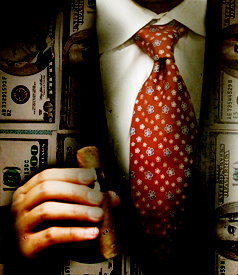So BNP Paribas, the largest French and European bank, has just announced 8 billion euros of profit for 2009, tying its 2007 record. Some are already crowing: after all, isn’t it better to have healthy rather than failing banks? Certainly.
However, it is well worth the attempt to understand where these profits come from. The profits of the ten largest European banks approached 50 billion euros in 2009. When we add in the ten biggest American banks, total profits reach 100 billion euros. Where do these profits come from, when the entire region was in recession in 2009? The most obvious explanation is that, during the crisis, central banks lent banks money at very low interest rates, money the banks used to lend on at higher rates to other actors: households, companies and, most especially, governments.
Let’s attempt a small calculation, approximate and imperfect, but that at least has the merit of illustrating the magnitude of the sums in play. Between September and December 2008, the European Central Bank (ECB) and the American Federal Reserve (Fed) created close to two trillion euros of new money (close to ten percent of American and European GDP). This money was loaned to banks at rates of around one percent, for three to six month periods. The loans were more or less renewed throughout 2009: the February 2010 balance sheets of the ECB and the Fed are barely reduced from the record levels achieved at the beginning of 2009.
Let’s suppose that these 2 trillion euros loaned to the banks brought in an average return of 5 percent, either because they loaned the money at 5 percent to other actors or because that allowed them to reimburse debts that would have cost them 5 percent – which amounts to the same thing. The gross margin realized would be 80 billion euros (4 percent of 2,000), or the equivalent of 80 percent of the profits earned by the banks in 2009. Even allowing for a lesser margin, this would explain a good part of the total profits.
This does not imply that the central banks behaved badly: the new liquidities undoubtedly allowed a cascade of bankruptcies, as well as the transformation of the recession into a depression, to be avoided. As long as governments now succeed in imposing strict financial regulations allowing the repetition of similar disasters to be avoided, succeed in demanding an accounting (and taxes) from banks … and, incidentally, succeed in getting rid of the debt they’ve contracted with the banks.
In the absence of which citizens are likely to quite logically conclude that this whole sequence is an economic absurdity: bank profits and bonuses take off, jobs and salaries remain at half-mast and now we have to tighten our belts to repay public debt, itself created to soak up the bankers financial follies … bankers who, moreover, have returned to speculating, this time at the expense of governments, with interest rates of close to 6 percent imposed on Irish and Greek taxpayers. Greek taxpayers, who, moreover, have unknowingly paid 300 million euros in fees to Goldman Sachs for dressing up their own public accounts.
Demagoguery? No. Simply an observation: to reconcile citizens with the banks will require something other than grand speeches. Obama has finally understood that, announcing in January a banking regulation plan that – at last – is ambitious. But he is politically weakened. In Europe, the fact that the ECB continues to rely on rating agencies when buying government securities (the announcement that precipitated the Greek crisis), when nothing in its statutes compels it to do so, makes no sense in the present context.
With this crisis, the ECB has convinced Europeans of its utility: everyone understands that allowing the markets to speculate on the franc, the German mark, and the Italian lire would not have helped. Now, the bank may stake out its autonomy from the financial markets, supported by true European economic governance.
Across the Atlantic, the public powers that be do not have the same sense of delicacy: over a year, the Fed has printed 300 billion dollars to buy Treasury securities without asking the market’s opinion. Europe should also accept that a 4 or 5 percent inflation rate is the least bad way to get rid of the debt. Otherwise, European citizens will once again have to pay the bill. And it’s not certain that they’ll agree to being rolled again.
Thomas Piketty is director of studies at EHESS and professor at l’Ecole d’économie de Paris.
Translation: Truthout French Language Editor Leslie Thatcher.
Press freedom is under attack
As Trump cracks down on political speech, independent media is increasingly necessary.
Truthout produces reporting you won’t see in the mainstream: journalism from the frontlines of global conflict, interviews with grassroots movement leaders, high-quality legal analysis and more.
Our work is possible thanks to reader support. Help Truthout catalyze change and social justice — make a tax-deductible monthly or one-time donation today.
